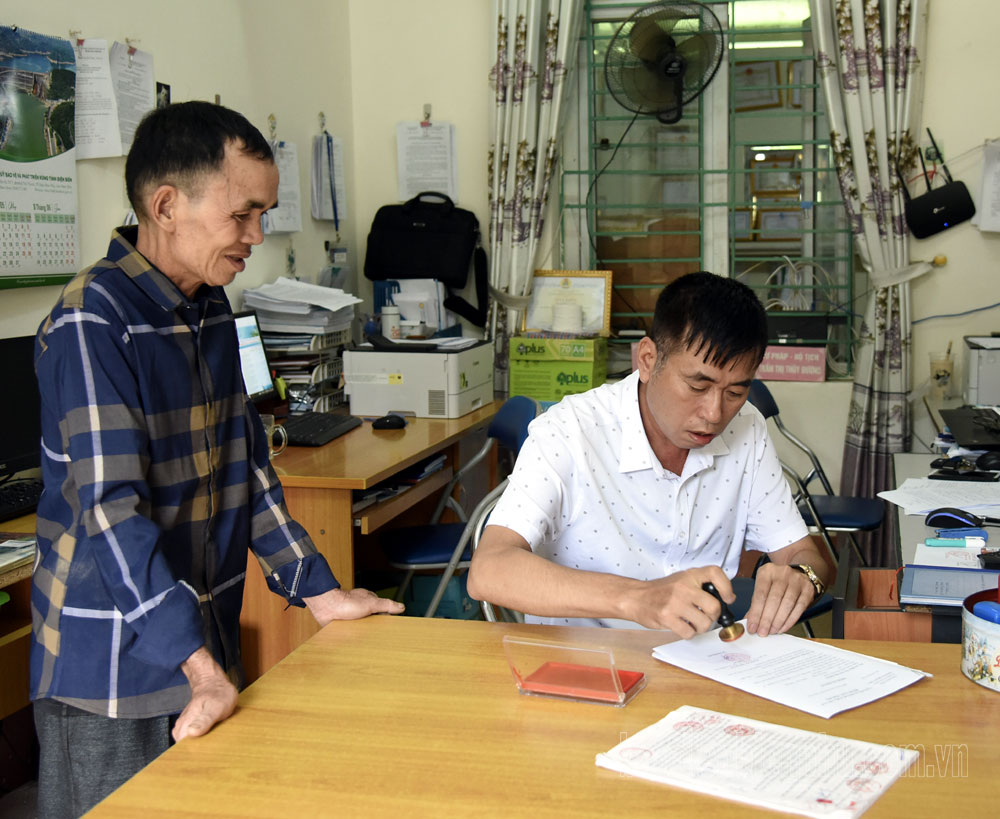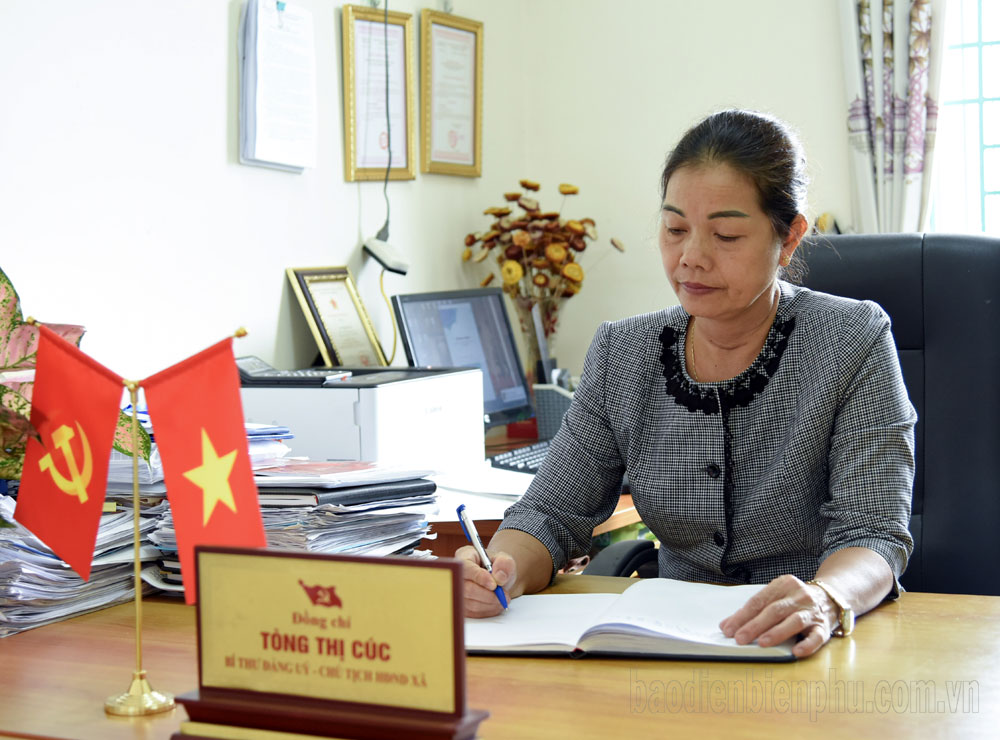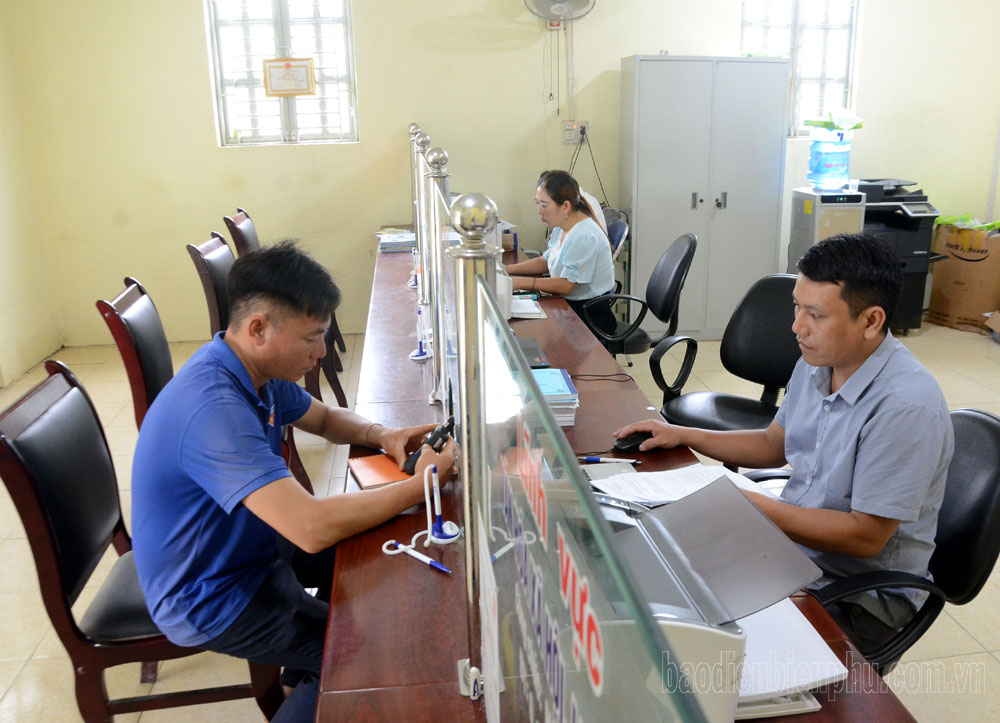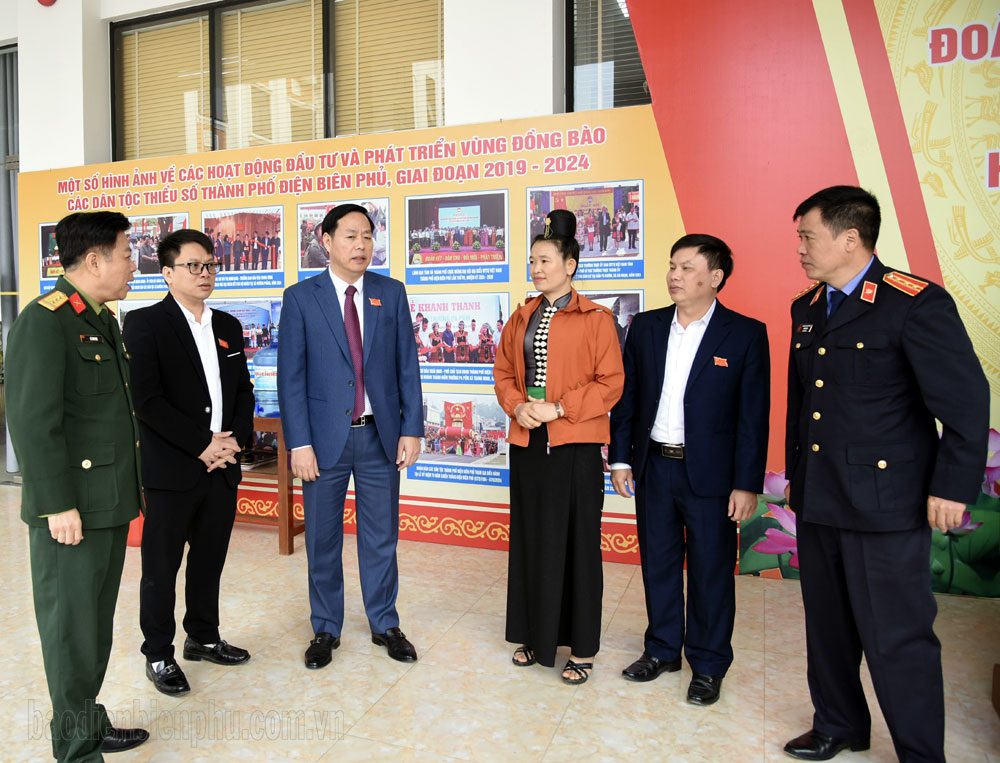However, the implementation process faces considerable challenges, particularly the reluctance to change. Some individuals and organizations express concerns about losing positions, benefits, or feeling unsettled by major changes. Therefore, developing a transparent and scientific roadmap, while addressing the psychological aspects of personnel, is deemed a decisive factor in the resolution’s success.

An official at the “one-stop” division of the Quài Cang Commune People’s Committee, Tuần Giáo District, handle administrative procedures for a local resident.
Promoting the spirit of setting example
Practical experience has shown that where cadres and Party members, especially leaders, promote the spirit of setting examples, the organizational apparatus will operate with greater efficiency and effectiveness. This is no exception when implementing the streamlining and restructuring of the political system under Resolution No.18.
Mr. Lò Văn Nguyên, who began his career in 1985, was appointed Secretary of the Party Committee and Chairman of the People’s Council of Mường Thín Commune, Tuần Giáo District, after years of dedication and effort. With nearly 40 years of service, he held various positions, including Secretary of the Commune Youth Union, Chief of the Commune Police, and Permanent Deputy Secretary of the Commune Party Committee. However, given the new demands of the current context, Mr. Nguyên recognized that his intermediate-level diploma no longer met the professional requirements of his position.
In response to the policy of personnel restructuring under Resolution No.18, Mr. Nguyên voluntarily applied for early retirement. Reflecting on this decision, he shared: “When my superiors first discussed this with me, I had some concerns and mixed feelings. However, upon reviewing the new standards, I realized that I did not meet the updated professional qualifications. As both a Party member and a leader within the Party organization, I understand the importance of this political mission. Therefore, I felt it was my responsibility to lead by example, take the initiative, and actively comply with the personnel restructuring policy.”

Mrs. Tòng Thị Cúc on her last working day at the headquarters of the Party Committee in Quài Cang Commune before taking early retirement.
Despite not being required to retire under Resolution No.18, Mrs. Tòng Thị Cúc, Secretary of the Party Committee of Quài Cang Commune, Tuần Giáo District, recently volunteered for early retirement. As a native of the area, Mrs. Cúc began her teaching career in 1992 in Mường Mùn Commune. Since then, she held various significant roles in schools and commune-level government bodies across the district. With over 30 years of public service, stepping down has brought some emotional adjustment. However, Mrs. Cúc views her decision with positivity, as it aligns with her personal aspirations.
“This streamlining initiative is not simply about reducing staff numbers; it is about reorganizing the workforce to be leaner, more effective, and capable of meeting modern challenges. I feel my time has come to step aside. My health has declined, and my mental sharpness is not what it used to be. I did not want to place undue strain on my superiors or my unit, so I decided to submit my retirement request. Moreover, the current demands of the job require adaptability, creativity, and innovation. It is only right for my generation to make way for younger, more dynamic individuals to grow and contribute,” stated Ms. Cúc.

Most of the officials included in the first round of personnel restructuring in 2025 have voluntarily opted to respond to the policy.
Giving priority to stabilizing mindset and conducting practical policies
Mr. Nguyên and Mrs. Cúc are among 35 individuals included in the first phase of personnel restructuring for 2025, as stipulated in Decision No.2305/QĐ-UBND, issued on December 18, 2024, by the Điện Biên Provincial People’s Committee. The decision mandates that leaders of agencies, units, and localities bear full responsibility for the outcomes of streamlining efforts within their jurisdictions. Of the 35 personnel, 17 opted for early retirement, while 18 resigned immediately. The majority of those affected come from commune-level administrative offices and public service sectors. To support the policy, the provincial People’s Committee has allocated over VND 6.4 billion for compensation, with everyone receiving between VND 100 - 380 million, depending on their circumstances.
Mr. Nguyên described the financial support as a reflection of the policy’s humanity and fairness, underscoring the province’s commitment to ensuring the well-being of affected individuals. For him, beyond ensuring peace of mind and fairness, this support offers a crucial financial foundation to invest in his family’s future ventures. “Following my retirement, I intend to dedicate my time and resources to livestock farming and planting coffee and macadamia trees,” he shared.

Senior officials retiring creates opportunities for younger cadres to bring into play their capabilities.
It is clear to say that the restructuring and streamlining of the political system’s organizational apparatus, at any stage, aims to establish a lean, effective, and efficient political system that serves the people optimally. However, the most significant challenges in this process lie in managing surplus personnel and addressing the resistance to change among some cadres. These individuals may feel uneasy about the adjustments, potentially causing disruptions to the political system’s initial operations and impacting local socio-economic development.
To address these challenges, the province has placed a strong emphasis on providing psychological support for cadres while ensuring fair implementation of related policies.
The Party Affairs Board of the provincial People’s Committee recently issued Document No.480, outlining directives for reviewing the implementation of Resolution No.18 and restructuring organizations across the province. The plan includes reducing five provincial-level specialized departments, two district-level agencies, and 31 public service units. The board has instructed agencies, units, and localities to prioritize stabilizing the mindset of personnel throughout the process. In addition to policies from the Central, the province will implement unique and tailored mechanisms to ensure the welfare of cadres and civil servants who are no longer in active service or are subject to streamlining. These policies are designed to secure public consensus and foster alignment in thinking among cadres and Party members. By adopting these measures, the province aims to ensure a smooth transition while maintaining public trust and organizational cohesion.

Engaging in discussions and promptly addressing the thoughts and aspirations of cadres and Party members is a priority for leaders across sectors and localities in the province.
Mr. Trịnh Hoàng Thắng, Director of the provincial Department of Home Affairs, emphasized that the streamlining and restructuring of administrative agencies and the merging of units within the province are being implemented in line with Central’s directives. The department has proactively coordinated with the provincial Department of Labor, Invalids, and Social Affairs - the key agency involved in the merger. The immediate priority is to reassure the morale of officials, civil servants, and employees from both departments, particularly given the heavy workload at the end of the year.
“The restructuring plans have been finalized by all agencies and localities within the province with full consensus from officials, Party members, civil servants, and employees, as well as strong support from the public,” Mr. Thắng said. “By the end of February, the provincial and district-level People’s Committees are required to submit reports on the organizational structures of their specialized agencies. To meet this deadline, it is essential to ensure consistent, unified leadership and thorough preparation of all plan details.”
With proactive efforts, strong determination across the political system, and the support of tailored policies and mechanisms, Điện Biên Province is well-positioned to effectively implement Resolution No.18.




.jpg)

.jpg)
.jpg)
.jpg)
.jpg)



.jpg)



.jpg)
.jpg)
.jpg)

You have 500/500 characters left
Please enter 5 or more characters!!!